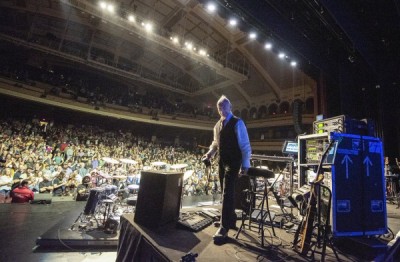A question that's frequently asked on RF's Facebook page when RF responds to negative comments/posts: why do you even bother?
RF's response:
I
To refine my personal practice
1. To develop equanimity, to find a Still Point within the swirlingness of a life mostly conducted in public view.
In traditional practices, such as Buddhism, this Still Point tends to be cultivated through meditation. In my practice, may I find equanimity within the (frequently hostile) conditions of my professional life? These are “three winds” of musicians, audients and industry players.
2. To see myself more clearly.
This by monitoring my affective-response to whether any comment “lands” in my feelings. If so, what does this tell me? If not, what does this tell me?
A real Friend will tell us what we need to know about ourselves. Conventionally, few friends will risk their friendship by being honest about our shortcomings and achievements. So, it is easier to receive clear feedback from our “enemies” than our “friends”, wishing and hoping that both enemies and friends are impartial.
3. To see ourselves as others see us.
There have been times when Fripp has been fashionable: these are times of danger.
As a young man in his twenties, going home to Wimborne, Dorset served as a useful reminder of status. As a young man in his thirties, living in NYC, the three criteria were:
i) ride on public transport wherever possible;
ii) do your own grocery shopping;
iii) do your own laundry.
5. To extend to others the courtesy required of human beings in dialogue; and where this is beyond me, to be polite.
6. To know directly the poverty of my being.
7. To remind myself: at a certain point, we are all the same person.
What is highest in me is not far from what is highest in you. What is highest is you, is not far from what is highest is us all. What is highest is us all, is close to what is Highest.
Whatever we understand by Highest.
II
To refine my professional practice
1. To develop an ethics of musical engagement where the relationship between music, musicians and audience is mediated by commerce; ie to negotiate the terms of Performance Practice in a market culture.
2. To develop criteria for interaction between musicians and audients where the relationship is mediated by music; ie to negotiate the terms of Performance Practice in a musical culture.
3. To engage with those who have taken a specific interest in my work.
4. To report on the professional life.
6. To hold to account. We are all accountable for our actions; and publicly accountable for our actions in public.
7. To demonstrate that our actions have effect; even where these appear to be small; even where we believe these will make no difference.
III
What have I learnt?
(inter alia)…
1. What we see in others is what we know most deeply in ourselves.
2. If our head is placed where sunshine never falls, better not to go out in public and comment on the weather.
3. Nothing is possible in The Basement.
4. A reasonable person might despair.
5. Goodwill is not enough.
But it is a very good beginning.
6. Act with courtesy.
Otherwise, be polite.
7. The centre of discipline: the level at which we are able to maintain control in the face of a challenge.
So, all in all, part of an excellent liberal education for that young man who set off from Dorset to London in 1967.
Thursday 16th. April, 2020;
Bredonborough, Middle England.





